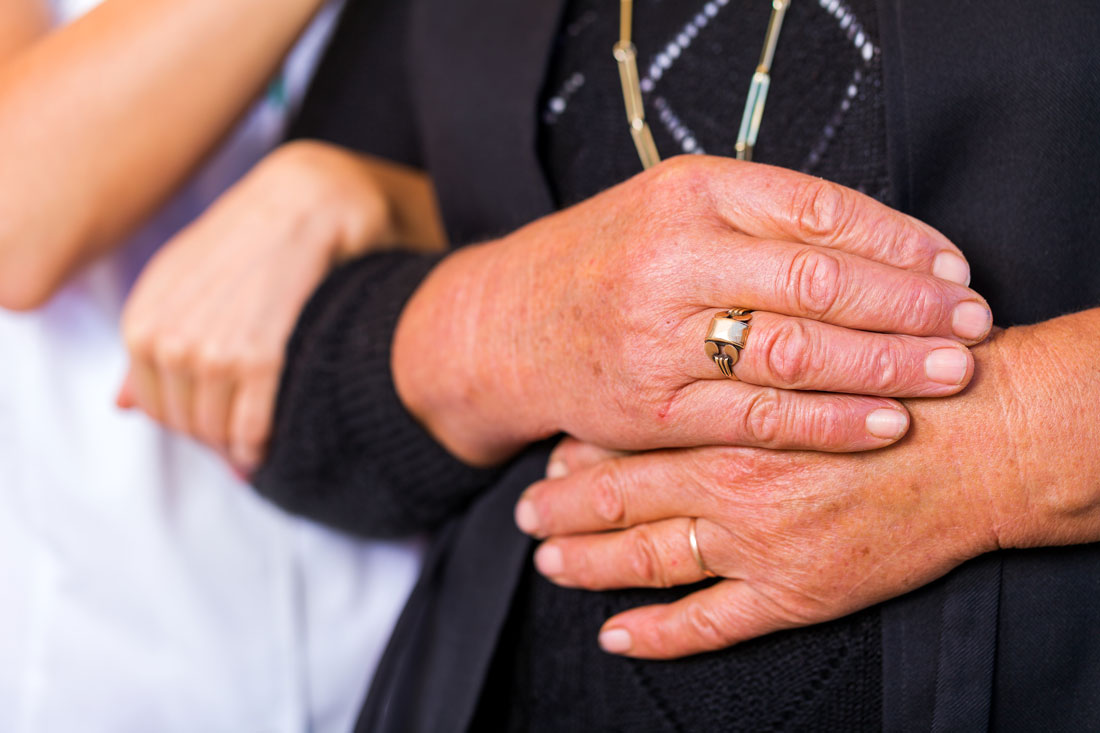Understanding Grief
Grief is the normal and natural response to the loss of someone or something important to you. It is a natural part of life. Grief is a typical reaction to death, divorce, job loss, a move away from family and friends, or loss of good health due to illness.
Grief Reactions
In hospice we use the word DABDA often, which is an acronym for the five stages of death and dying. These stages have different emotional responses that people go through in response to the knowledge of death: denial, anger, bargaining, depression, acceptance.
- Denial – The first reaction is denial. In this stage individuals believe the diagnosis is somehow mistaken, and cling to a false, preferable reality.
- Anger – When the individual recognizes that denial cannot continue, they become frustrated, especially at proximate individuals. Certain psychological responses of a person undergoing this phase would be: “Why me? It’s not fair!”; “How can this happen to me?”; “Who is to blame?”; “Why would this happen?”.
- Bargaining – The third stage involves the hope that the individual can avoid a cause of grief. Usually, the negotiation for an extended life is made in exchange for a reformed lifestyle. People facing less serious trauma can bargain or seek compromise. For instance: “I’d give anything to have him back.” Or: “If you take this diagnosis away, I promise to be a better person!”
- Depression – “I’m so sad, why bother with anything?”; “I’m going to die soon, so what’s the point?”; “I miss my loved one, why go on?” During the fourth stage, the individual despairs at the recognition of their mortality. In this state, the individual may become silent, refuse visitors and spend much of the time mournful and sullen.
- Acceptance – “It’s going to be okay.”; “I can’t fight it; I may as well prepare for it.” In this last stage, individuals embrace mortality or inevitable future, or that of a loved one, or other tragic event. People dying may precede the survivors in this state, which typically comes with a calm, retrospective view for the individual, and a stable condition of emotions. Kübler-Ross later expanded her model to include any form of personal loss, such as the death of a loved one, the loss of a job or income, major rejection, the end of a relationship or divorce, drug addiction, incarceration, the onset of a disease or chronic illness, an infertility diagnosis, and even minor losses, such as a loss of insurance coverage. Even sports fans go through such a process if their favorite team loses an important game, and also supporters of a losing candidate in an election.
Other Responses may include:
- Feeling empty and numb, as if you are in a state of shock.
- Physical responses such as nausea, trouble breathing, crying, confusion, lack of energy, dry mouth, or changes in sleeping and eating patterns.
- Anger—at a situation, a person, or in general.
- Guilt about what you did or did not do.
- Withdrawal from family, friends, and common activities.
- Difficulty focusing, working, or making decisions.
- Questions about faith or spirituality; challenges to the meaning, value, and purpose you find in life.
Grief may be experienced in response to physical losses, such as death, or in response to symbolic or social losses such as divorce or loss of a job. The grief experience can be affected by one’s history and support system. Taking care of yourself and accessing the support of friends and family can help you cope with your grief experience.
Grieving people have two choices.
The first choice is to try to avoid their grief and emotions associated with their loss and continue on with life, hoping to forget. This is a risky choice because when grief is ignored, it continues to cause distress.
The other choice is to recognize grieving and seek healing and growth. Coping with and adjusting to loss is slow, hard work. As difficult as it may sound, it is healing to embrace your grief, give it full expression and attention and, in so doing, distress will ease. While a show of strength at times of significant loss may seem admirable, it does not serve the need human beings have to express grief. It is essential to allow oneself to feel all the emotions that arise, as painful as they may be, and to treat oneself with patience and kindness.
There is no right way to grieve. It is an individual process and a natural part of life. Life won’t be the same after a loss, but experiencing your grief will allow you to adjust to life after loss.
Supporting a Grieving Caregiver
To support a caregiver who is grieving, ask how you can best help, and listen for what they seem to need. Express your concern for how the illness is affecting them personally. Even if you have been a caregiver yourself, don’t say you know what they are going through. Empathize, by saying, “I am so very sorry,” but don’t say you understand. Each situation is unique and each person responds in ways that are uniquely their own. Even though you may have been a caregiver yourself, you cannot understand this situation from this person’s perspective. Be willing to listen, to learn, to look for ways in which you can support and be helpful.
When caregiving ends, it is normal to feel both bereaved and relieved, but caregivers often feel guilty about any feelings of relief they may experience. Remind them that these feelings are normal and common. Caring for a loved one can be exhausting work, but when caregiving ends, time often seems endless. Offer to help grieving caregivers fill their day with meaningful activities. Help them get back into life at a pace that is acceptable to them. Caregivers often haven’t had enough sleep, nor have they eaten well, so encourage a grieving caregiver to obtain adequate rest and nutrition.
How Long Does Grief Last?
Grief lasts as long as it lasts. Although this statement may not seem helpful to you, it is true. It is different for each person. It is important to realize that, while grief and its intensity will subside, most find that it is replaced with a “sweet sadness” that comes at times of remembrance. This is simply the acknowledgement that significant loss has occurred. That the loss, and the person who is gone, matters and affects our lives.
There are many factors that affect how long a person grieves, including age, maturity, personality, physical and mental health, coping style, culture, spiritual and religious background, family background, other stressors and life experiences. The time spent grieving may also depend on how prepared a person was before the loss was experienced.
How Will I Know When I’m Done Grieving?
After a significant loss, you may be consumed and overwhelmed by the grief reactions you are experiencing. In time, as the reality of the loss sinks in, and all the changes as a result of the loss have been experienced, you will learn to adjust to living with your loss. Eventually, even after significant loss, you will realize you are grieving less as you discover renewed energy in living. You will become less consumed by the impact of the loss and begin to draw comfort rather than pain from the memories. In a sense, you are never “finished grieving.” With a significant loss, there will always be moments when you will remember the loss, and perhaps you will experience some of the feelings of grief, as in the times of “sweet sadness” mentioned above. Fortunately, the time period between these surges will lengthen considerably as you learn how to cope with your loss.










